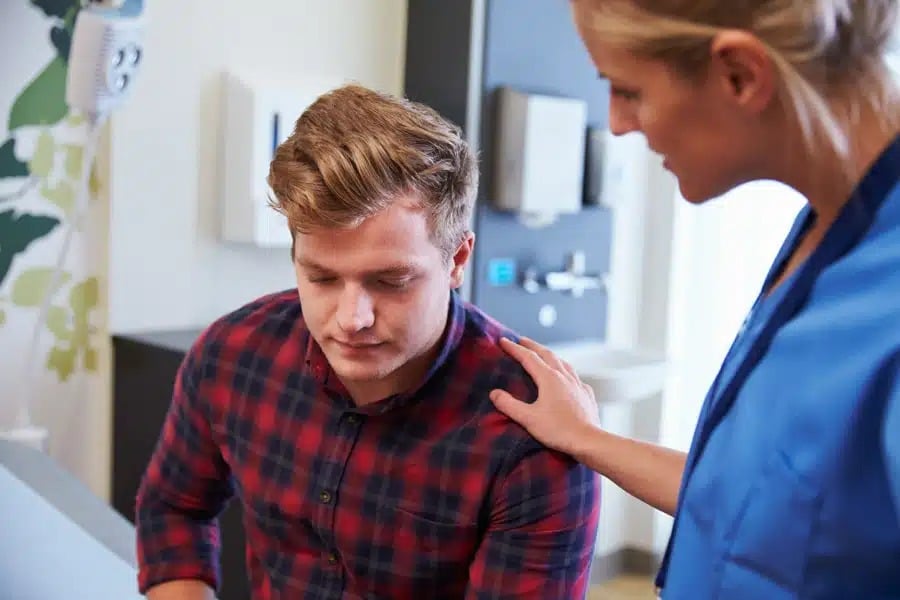- Home
- Program
- Mental Health
- Rapid Resolution Therapy, Florida
Rapid Resolution Therapy, Florida

Unresolved trauma is one of the major drivers of substance use disorders. These traumas impact a person’s ability to cope and meet their needs in a healthy, adaptive fashion. In the past, psychotherapy has used methods that, while effective, can take months to resolve these types of traumas.
However, a new form of treatment, Rapid Resolution Therapy (RRT) has been developed to help people overcome the lingering effects of unresolved trauma in much less time than typical therapies. Developed by Dr. Jay Connolly, RRT was originally designed to assist PTSD sufferers and survivors of sexual violence overcome self-destructive patterns of thinking, feeling, and behaving. However, RRT is also useful in combination with other traditional therapies in the treatment of alcohol and substance use disorders.
Receiving RRT at Agape Treatment Center in Ft. Lauderdale, Florida, offers significant value. It combines the benefits of this effective therapeutic method with the center’s unwavering commitment to compassionate, individualized care. Ultimately, this can lead to a transformative recovery experience, empowering individuals to attain the invaluable gift of long-lasting sobriety!
Table of Contents
ToggleWhat is Rapid Resolution Therapy?
Rapid Resolution Therapy (RRT) is a type of psychotherapy that aims to help individuals permanently overcome the effects of trauma and other negative life experiences. It was developed on the idea that it’s possible to gain conscious control over unconscious thought processes, thus allowing one to let go of distressing feelings and unwanted behaviors. Rapid Resolution Therapy is a form of talking therapy facilitated by a licensed RRT therapist that lasts from two to six sessions.
RRT uses techniques from hypnotherapy, guided imagery, storytelling, and multilevel communication to change the way the brain processes information and responds to stimuli. This can result in a rapid decrease in emotional pain and destructive behavioral patterns. There are some similarities to Eye Movement Desensitization and Reprocessing (EMDR) therapy, in that it relies on neurological re-framing to remove the emotional impact of past traumas.
One of the unique features of RRT is its speed. While traditional therapies can take months or years to show results, RRT often brings about significant change in just a few sessions. However, the number of sessions required can vary depending on the individual and their specific issues.
Please note that while RRT can be very effective, it is not a substitute for medical treatment and should be used under the guidance of a licensed healthcare professional. For more information about Rapid Resolution Therapy, you might want to consider consulting a mental health professional or visiting the official website of the Institute for Rapid Resolution Therapy.
What are the Benefits of Rapid Resolution Therapy?
Rapid Resolution Therapy has several benefits:
Holistic Approach
Rapid Resolution Therapy works by recognizing the interconnectedness of the mind and body. It addresses emotional trauma, which in turn supports the body’s healing process.
Eliminates Negative Impacts of Past Experiences:
As an evidence-based technique, RRT aims to help eliminate the negative impacts of past experiences.
Gentle Process:
RRT utilizes symbolic imagery and metaphors for trauma recovery and emotional healing. This gentle process can help individuals get their life back after traumatic experiences.
Does Not Require Reliving Trauma:
One major benefit is that it does not require individuals to relive their traumatic experiences. Healing comes from releasing blocked energy, allowing for both physical and emotional healing.
Resolves Painful Experiences:
RRT works with both the conscious and unconscious mind to resolve painful experiences completely.
Effective for PTSD and Trauma:
RRT has been shown to quickly and effectively resolve the symptoms associated with Post-Traumatic Stress Disorder (PTSD) and trauma.
Please note that these benefits can vary, and the therapy should be administered by a licensed professional.
How Does Rapid Resolution Therapy Work?

RRT seeks to identify traumatic issues and the reflexive, painful emotions elicited from recalling those events. Considering how a single memory or thought can provoke a cascade of painful emotions, RRT then helps a client learn to re-frame those thoughts by using storytelling, guided imagery, and creativity to break painful and unhelpful conditioned responses. As those forms of automatic responses are eliminated, the client begins to build a new neural pathway that does not include the emotional reaction that used to accompany the traumatic thought.
Rapid Resolution Therapy works by engaging both the conscious and unconscious mind to help a person eliminate the ongoing effects stemming from traumatic experiences. Here’s a breakdown of how it works:
Identifying the Issue:
The therapist first identifies a specific traumatic event or negative experience that is causing distress to the individual.
Establishing Communication:
The therapist communicates with the conscious and subconscious mind to gain a clear understanding of the individual’s thoughts, feelings, and behavior.
Transforming Emotional Responses:
RRT uses techniques derived from hypnotherapy and neuro-linguistic programming to change the way the brain processes information about the traumatic event. This can transform the emotional response associated with the memory of the event.
Clearing the Trauma:
Through guided imagery, metaphors, and multi-level communication, the therapist helps the individual to resolve the trauma and clear the associated emotional disturbance. This process doesn’t require the individual to relive the traumatic experience.
Reframing and Integration:
Finally, the therapist helps the individual to integrate the new, healthier responses into their life. This can result in a rapid decrease in distress and improvement in overall well-being.
As a result, the emotional pain and reactions are no longer present, and a person is no longer triggered by similar thoughts, smells, or sensations.
It’s important to note that while RRT can bring about significant changes in a few sessions, the number of sessions required can vary depending on the individual and their specific issues. Also, RRT should also be administered by a trained and licensed professional.
What Other Forms of Therapy Support Rapid Resolution Therapy?
There are several other forms of therapy that can work in conjunction with Rapid Resolution Therapy (RRT) to support the healing process:
Eye Movement Desensitization and Reprocessing (EMDR): Like RRT, EMDR is used to treat trauma and PTSD. It involves the use of eye movements to help the brain process traumatic memories and reduce their long-lasting effects.
Accelerated Resolution Therapy (ART): ART is a form of psychotherapy that aims to resolve trauma quickly, much like RRT. It uses a combination of techniques from other therapies but achieves benefits more rapidly. It’s particularly useful for people suffering from PTSD and other mental health conditions.
Rapid Trauma Resolution Therapy (RTR): Although it’s a relatively new type of treatment, RTR is designed to help individuals permanently overcome the effects of trauma. It’s similar to RRT in its approach and goals.
Hypnotherapy: RRT incorporates elements of hypnosis, guiding individuals to a relaxed state where they can explore and reframe traumatic memories.
These therapies can be used independently or in conjunction with each other, depending on the individual’s needs and the therapist’s approach. Remember, it’s important to seek therapy from a licensed professional and discuss the best treatment options for your specific circumstances.
Our Mental Health & Addiction Treatment Services

Research has repeatedly demonstrated that a combination of therapeutic methods, along with holistic whole-person approaches to healing, is the most effective way to treat drug and alcohol addiction for long-term recovery.
In addition to Rapid Resolution Therapy, Agape Treatment Center provides clients with a range of proven therapeutic methods, including:
- Cognitive Behavioral Therapy
- Dialectical Behavioral Therapy
- Brain Mapping
- Eye Movement Desensitization and Reprocessing
- Biofeedback Therapy
Begin your Addiction Recovery Journey at Agape Treatment Center in Ft. Lauderdale!
If you are concerned about a substance or alcohol use problem, Agape Treatment Center is available to help. Our evidence-based, comprehensive, and individualized treatment programs can help you or your loved one overcome withdrawal and addiction to any substance.
Please give us a call—we are ready to help around the clock, every day of the week. Our admissions counselors will work with you in determining how to cover the cost of treatment, then will help you set up viable travel plans and set up a date and a time for intake
- February 22, 2023
- Updated Date: February 20, 2024
Addiction Recovery Services

Stephanie Robilio, LCSW( Medical Reviewer )
Stephanie Robilio is an accomplished Clinical Director at Agape Behavioral Healthcare. With a Master of Social Work degree, LCSW license, and extensive training in Rapid Resolution Therapy under her belt, she brings a wealth of expertise to her role. Her unique combination of education and experience allows her to provide exceptional care to clients and lead her team with confidence. Stephanie’s joy comes from witnessing the moments when her patients creatively connect the dots and bravely move toward reclaiming their power. Her purpose is to help individuals understand their past so they can create a future full of hope, growth, and success. Stephanie attributes a large portion of her success to the supportive culture and strong sense of community fostered by the Agape team.



